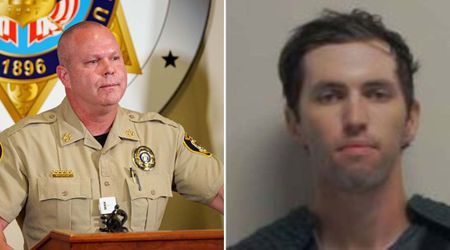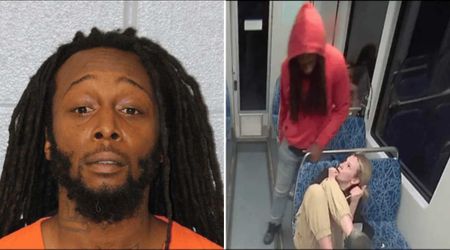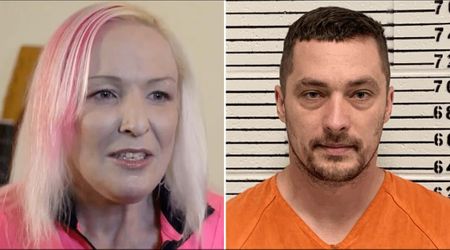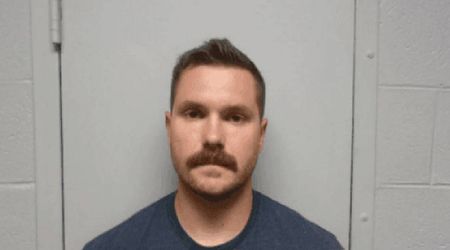Terry Hughes Jr: Shooter who gunned down 4 cops in Charlotte before being killed had criminal record spanning 15 years

Warning: This article contains a recollection of crime and can be triggering to some, readers’ discretion advised.
CHARLOTTE, NORTH CAROLINA: Terry Clark Hughes Jr, 39, fatally shot four law enforcement officers and injured four others in east Charlotte on Monday, April 29. He had a history of convictions across the state.
Hughes was the subject of a warrant and fired a high-powered rifle at officers in Charlotte as per WCNC. The deadly shooting occurred as officers attempted to apprehend Hughes on charges of possession of a firearm by a felon and two counts of felony flee to elude Lincoln County.
During the confrontation at Hughes' residence, officers were shot, and they returned fire, resulting in Hughes' death at the scene. As reported by NBC, the victims have been identified as Sam Poloche, aged 42, and William 'Alden' Elliott, aged 46, both of whom were 14-year veterans with the North Carolina Department of Adult Correction. Deputy US Marshal Thomas M Weeks Jr and Charlotte-Mecklenburg Police Officer Joshua Eyer were also killed, according to authorities.
Terry Clark Hughes Jr had criminal record spanning 15 years
Terry Clark Hughes Jr had an extensive criminal record spanning nearly 15 years. Hughes faced a total of 49 criminal charges since 2001, as reported by WCNC. According to court records from Person County, Hughes pleaded guilty to a felony in 2010. He served around six months in prison before being released in May 2011. Records from the North Carolina Department of Public Safety indicate that Hughes served prison sentences in 2011 and 2013.
In June 2012, Hughes was arrested following a high-speed chase in Alamance County, east of Greensboro and west of Raleigh-Durham. Deputies reported that Hughes led them on a pursuit, reaching speeds exceeding 100 mph, after making a U-turn to evade a checkpoint. He was wanted on multiple warrants across several counties for failing to appear in court.
In May 2021, CMPD arrested Hughes on numerous drug charges and for fleeing or eluding arrest with a motor vehicle. Records indicate that he was released from jail mere hours later.
Several charges against Hughes were dismissed in 2021 in Mecklenburg County, including manufacturing marijuana, possession of marijuana with intent to sell or deliver, possession of marijuana paraphernalia, and driving with a revoked license.
According to court records, Hughes has an ongoing case from late 2021 in Person County for possession of a firearm by a felon and possession of marijuana. A warrant indicates that the Person County Sheriff's Office discovered Hughes in possession of a handgun. Records indicate that he missed a court date for these charges in February 2023.
On that same day, the courts issued an outstanding arrest order, as confirmed by the clerk's office as per Whash11. He was also charged with felony fleeing to elude arrest following a January 6 incident in Lincoln County. Notably, the latter charge was dismissed earlier this month, according to court records.

Police did not consider Terry Clark Hughes Jr dangerous
During a news conference, Charlotte-Mecklenburg Police Chief Johnny Jennings said that officers may not have considered Hughes as very dangerous when they went to serve him warrants.
Hughes fired over 100 rounds from a powerful rifle at officers outside the home he was in. He was upstairs during the standoff, according to the chief. When asked by the Observer if CMPD officers knew Hughes, Chief Jennings explained that each division encounters certain individuals frequently and is aware of them.
While Hughes had a long criminal history, Chief Jennings wasn't sure how familiar division officers were with him or how long he had lived at that residence. Chief Jennings was asked if Hughes should have been released.
Jennings admitted that many individuals should not be out causing harm to citizens, expressing concerns about the court system being overwhelmed. While he doesn't have all the answers, he emphasizes the importance of holding people accountable for their actions, whether through incarceration, probation, or fines.










